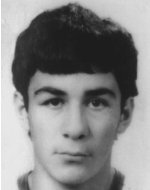Shmuel, son of Frida and Jacob, was born in Tel Aviv on July 20, 1950. He completed his studies at the Habonim Elementary School in Tel Aviv and later completed his studies at the Tel Aviv high school. Shmuel was the type of student every teacher would like to find in his class. Already in the elementary school, the teacher noticed his kindness and seriousness and seated beside him the “rebellious” students, so that she could conduct the class quietly and attentively. Shmuel would silence them and not answer them when they approached him during class, and even though they bothered him, he did not even think of asking the teacher to change places, because he wanted to prevent her suffering and anxiety. Samuel was kind by nature, and there was no need to draw his attention on the bus, to give his seat to an adult, for he did so for granted. When he was ten, they asked him if he loved money, and he answered: “Yes, to give to others who need it.” “The class in which he studied was very large in the student population and was characterized by social tension, resulting from student inequality and competition from the” ultra-Orthodox “class, all of which created difficulties in classroom education and classroom management But Shmuel was different from most of the students, as if he did not belong to this framework. Shmuel did not have to turn at all because he was known to extend help to anyone who wanted it, and his kindness gave him many friends, and his honesty gave him special status in the class. I know that it is possible to say, without a hint of empty rhetoric, that with his death our world will become thinner, because it is precisely because of these few noble souls that Shmuel is one of them that there is beauty and a degree of mercy and kindness in this world The fall of Shmuel in the battle is exhausting his way of life. He sacrificed the most precious to him-his life, for us, so that we could continue to live, to give birth, to create and to build. His love for music was not limited to one area, he loved classical music, jazz and pop, and even completed a conservatory on the accordion. Shmuel was drafted into the IDF in mid-August 1968 and assigned to the Armored Corps . After basic training and after completing his course in tank artillery and tank commanders courses, he was assigned to the 7th Brigade. He was an exemplary soldier in his behavior and dedication to every position he was assigned. He participated in the War of Attrition on the Suez Canal and in battles in the Jordan Valley. Even when he was in the army, he excelled in justice and kindness, and when he saw that an act of injustice had been committed, or felt that injustice had been done to someone, he did not hesitate to say what was on his mind, even to a high commander. In mid-August 1971, Shmuel was released from regular service and assigned to a reserve unit. He enrolled in academic studies at the Hebrew University of Jerusalem. In his first year he studied economics and sociology, and at the end of the year, he changed his economics studies in state science. In the second year he continued his studies and at the same time was accepted to the Israel Police and served at the national headquarters in Jerusalem. Shmuel devoted his few hours to his many friends and visited them and tried not to deprive any of them. On Yom Kippur 1973 he came to his home in Tel Aviv to fast and pray with his family in the neighborhood synagogue. When it became known that the war had broken out that day, and Shmuel had not yet been drafted, he decided to report on his own initiative and arrived at his unit in the north on his own. After the unit was organized, all the force went up to the Golan Heights in order to stop the Syrian attack. The unit was deployed in blocking positions along the oil pipeline. In the battle that took place on the 8th of Tishrei 5734 (October 8, 1973), in the area of the village of Nafach, Shmuel’s tank was hit and four of his five crew members were killed. He was brought to eternal rest in the military section of the Kiryat Shaul cemetery. Survived by his parents and sister. After his fall, he was awarded the rank of First Sergeant. In a letter of condolence to the bereaved family, his commander wrote: “Shmuel served in an armored unit and was one of the outstanding soldiers in the army, and he was loved by all of us, his commanders and his comrades, Will remain forever in the heart of all those who knew Him. ” Shmuel’s family published a book in his memory, including his words and friends’ talk about his character.
